Leadership and Management Report: Corus Group Operations and Analysis
VerifiedAdded on 2023/01/16
|14
|4114
|43
Report
AI Summary
This report provides a comprehensive analysis of leadership and management practices within the context of Corus Group, a steel manufacturing company. It begins by comparing the roles and characteristics of leaders and managers, highlighting their distinct responsibilities and contributions to organizational success. The report then delves into how leaders and managers navigate different business situations, such as implementing new technology and handling company acquisitions, showcasing their adaptability and strategic decision-making. Furthermore, it explores various leadership models and theories, including situational leadership, contingency leadership, and system leadership, evaluating their strengths and weaknesses. The report also examines the key approaches and functions of operations management, emphasizing its importance in enhancing productivity and profitability. Finally, it identifies and discusses the factors that influence operational decisions within the organization, providing a holistic view of management and leadership in the steel industry.
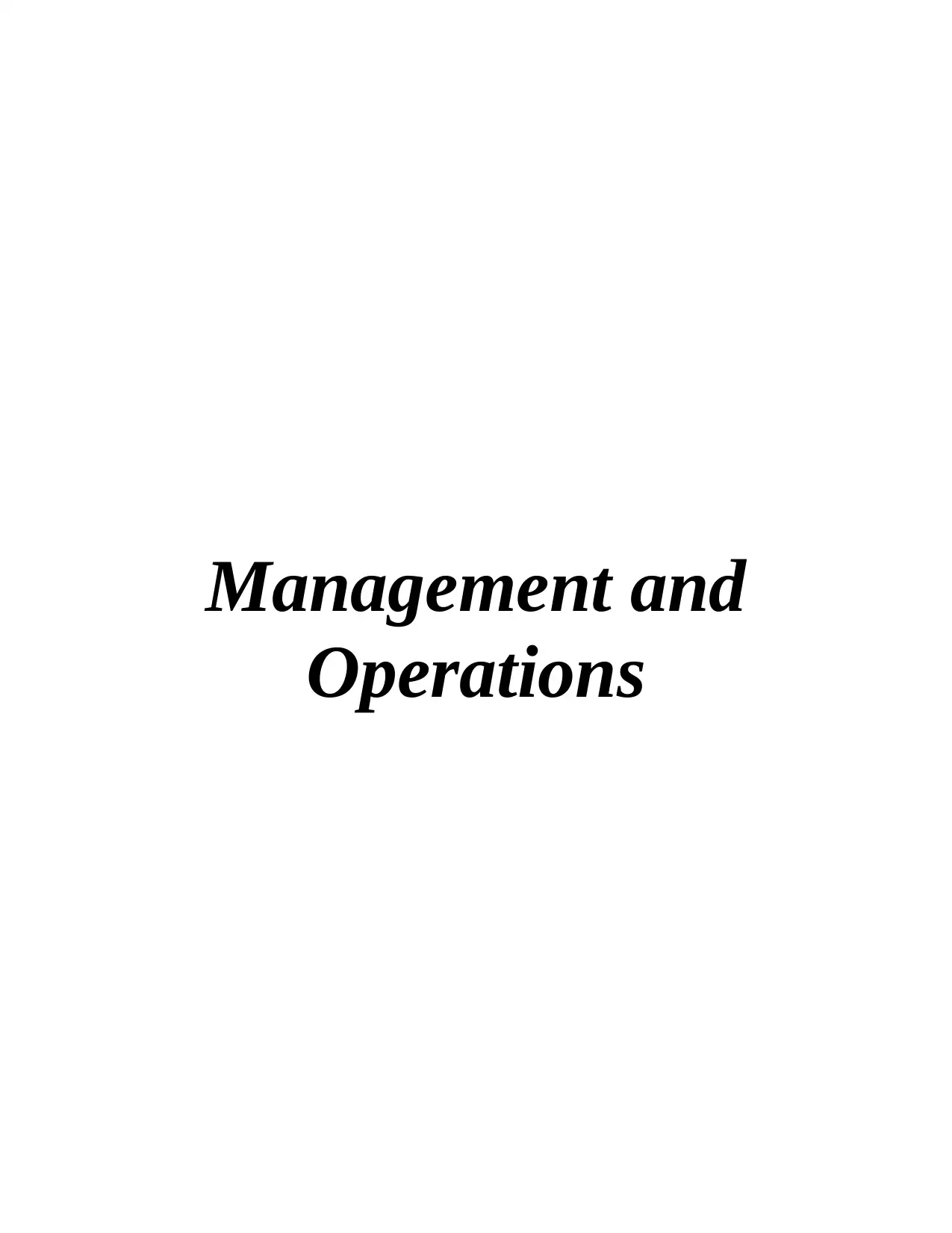
Management and
Operations
Operations
Paraphrase This Document
Need a fresh take? Get an instant paraphrase of this document with our AI Paraphraser
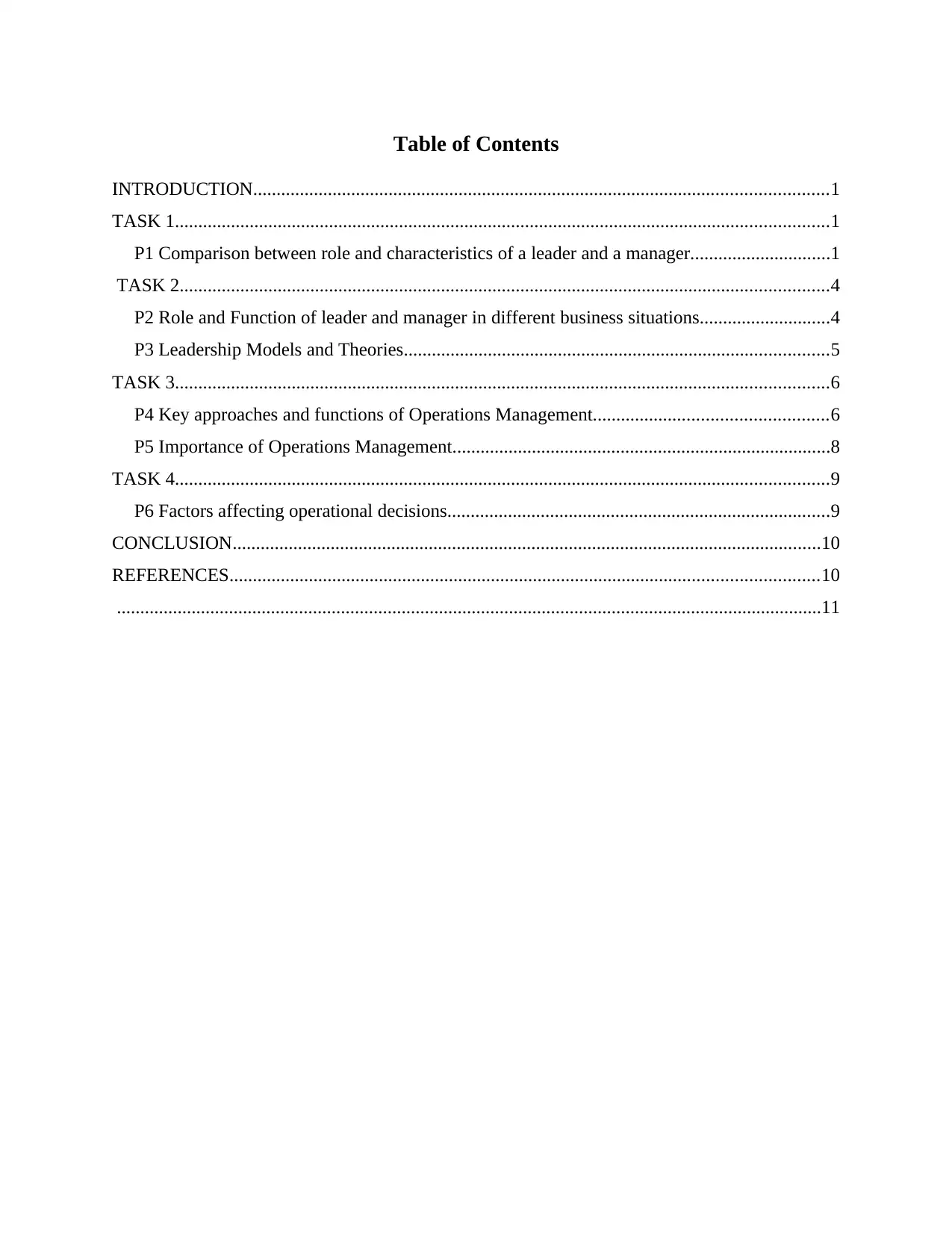
Table of Contents
INTRODUCTION...........................................................................................................................1
TASK 1............................................................................................................................................1
P1 Comparison between role and characteristics of a leader and a manager..............................1
TASK 2...........................................................................................................................................4
P2 Role and Function of leader and manager in different business situations............................4
P3 Leadership Models and Theories...........................................................................................5
TASK 3............................................................................................................................................6
P4 Key approaches and functions of Operations Management..................................................6
P5 Importance of Operations Management.................................................................................8
TASK 4............................................................................................................................................9
P6 Factors affecting operational decisions..................................................................................9
CONCLUSION..............................................................................................................................10
REFERENCES..............................................................................................................................10
.......................................................................................................................................................11
INTRODUCTION...........................................................................................................................1
TASK 1............................................................................................................................................1
P1 Comparison between role and characteristics of a leader and a manager..............................1
TASK 2...........................................................................................................................................4
P2 Role and Function of leader and manager in different business situations............................4
P3 Leadership Models and Theories...........................................................................................5
TASK 3............................................................................................................................................6
P4 Key approaches and functions of Operations Management..................................................6
P5 Importance of Operations Management.................................................................................8
TASK 4............................................................................................................................................9
P6 Factors affecting operational decisions..................................................................................9
CONCLUSION..............................................................................................................................10
REFERENCES..............................................................................................................................10
.......................................................................................................................................................11
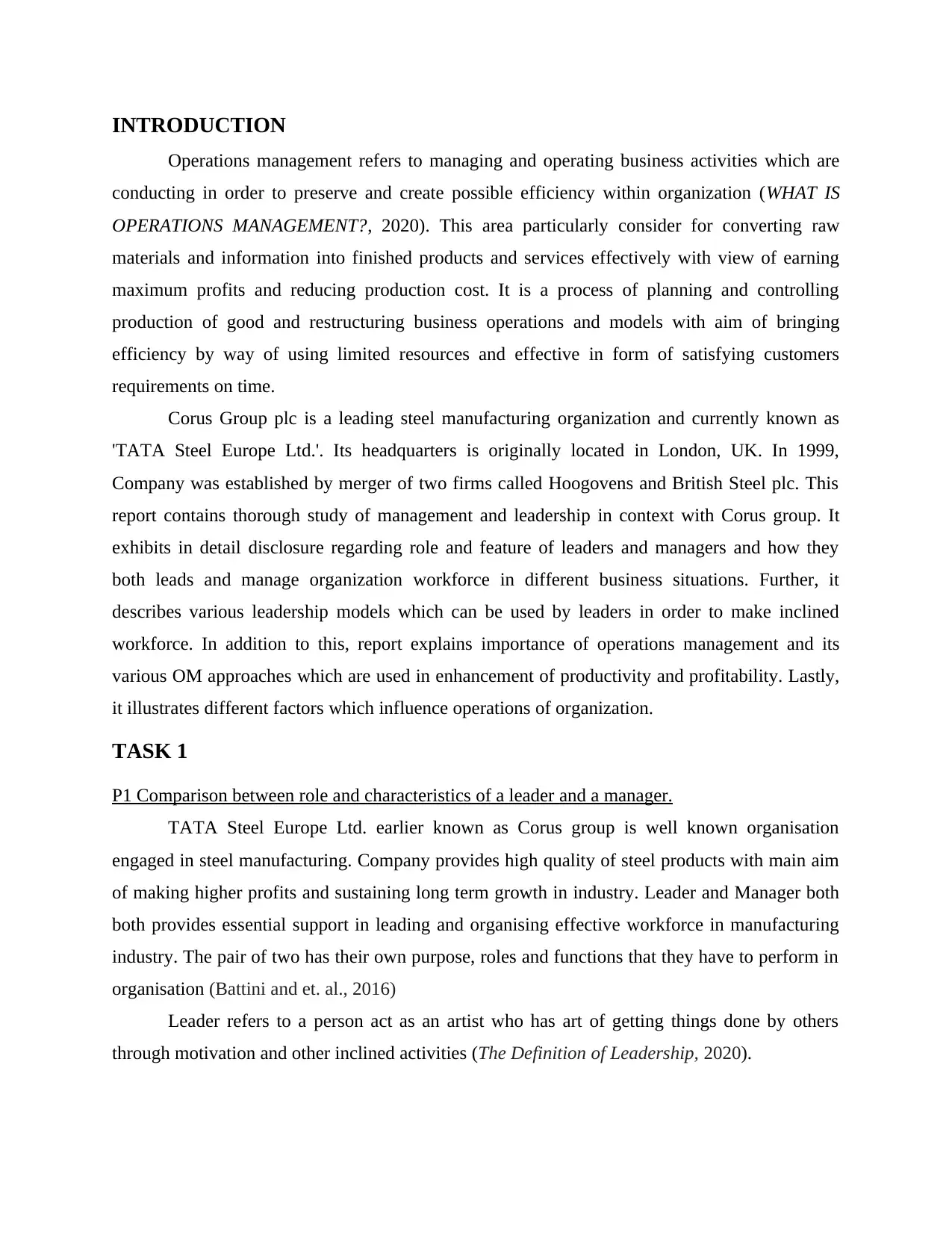
INTRODUCTION
Operations management refers to managing and operating business activities which are
conducting in order to preserve and create possible efficiency within organization (WHAT IS
OPERATIONS MANAGEMENT?, 2020). This area particularly consider for converting raw
materials and information into finished products and services effectively with view of earning
maximum profits and reducing production cost. It is a process of planning and controlling
production of good and restructuring business operations and models with aim of bringing
efficiency by way of using limited resources and effective in form of satisfying customers
requirements on time.
Corus Group plc is a leading steel manufacturing organization and currently known as
'TATA Steel Europe Ltd.'. Its headquarters is originally located in London, UK. In 1999,
Company was established by merger of two firms called Hoogovens and British Steel plc. This
report contains thorough study of management and leadership in context with Corus group. It
exhibits in detail disclosure regarding role and feature of leaders and managers and how they
both leads and manage organization workforce in different business situations. Further, it
describes various leadership models which can be used by leaders in order to make inclined
workforce. In addition to this, report explains importance of operations management and its
various OM approaches which are used in enhancement of productivity and profitability. Lastly,
it illustrates different factors which influence operations of organization.
TASK 1
P1 Comparison between role and characteristics of a leader and a manager.
TATA Steel Europe Ltd. earlier known as Corus group is well known organisation
engaged in steel manufacturing. Company provides high quality of steel products with main aim
of making higher profits and sustaining long term growth in industry. Leader and Manager both
both provides essential support in leading and organising effective workforce in manufacturing
industry. The pair of two has their own purpose, roles and functions that they have to perform in
organisation (Battini and et. al., 2016)
Leader refers to a person act as an artist who has art of getting things done by others
through motivation and other inclined activities (The Definition of Leadership, 2020).
Operations management refers to managing and operating business activities which are
conducting in order to preserve and create possible efficiency within organization (WHAT IS
OPERATIONS MANAGEMENT?, 2020). This area particularly consider for converting raw
materials and information into finished products and services effectively with view of earning
maximum profits and reducing production cost. It is a process of planning and controlling
production of good and restructuring business operations and models with aim of bringing
efficiency by way of using limited resources and effective in form of satisfying customers
requirements on time.
Corus Group plc is a leading steel manufacturing organization and currently known as
'TATA Steel Europe Ltd.'. Its headquarters is originally located in London, UK. In 1999,
Company was established by merger of two firms called Hoogovens and British Steel plc. This
report contains thorough study of management and leadership in context with Corus group. It
exhibits in detail disclosure regarding role and feature of leaders and managers and how they
both leads and manage organization workforce in different business situations. Further, it
describes various leadership models which can be used by leaders in order to make inclined
workforce. In addition to this, report explains importance of operations management and its
various OM approaches which are used in enhancement of productivity and profitability. Lastly,
it illustrates different factors which influence operations of organization.
TASK 1
P1 Comparison between role and characteristics of a leader and a manager.
TATA Steel Europe Ltd. earlier known as Corus group is well known organisation
engaged in steel manufacturing. Company provides high quality of steel products with main aim
of making higher profits and sustaining long term growth in industry. Leader and Manager both
both provides essential support in leading and organising effective workforce in manufacturing
industry. The pair of two has their own purpose, roles and functions that they have to perform in
organisation (Battini and et. al., 2016)
Leader refers to a person act as an artist who has art of getting things done by others
through motivation and other inclined activities (The Definition of Leadership, 2020).
⊘ This is a preview!⊘
Do you want full access?
Subscribe today to unlock all pages.

Trusted by 1+ million students worldwide
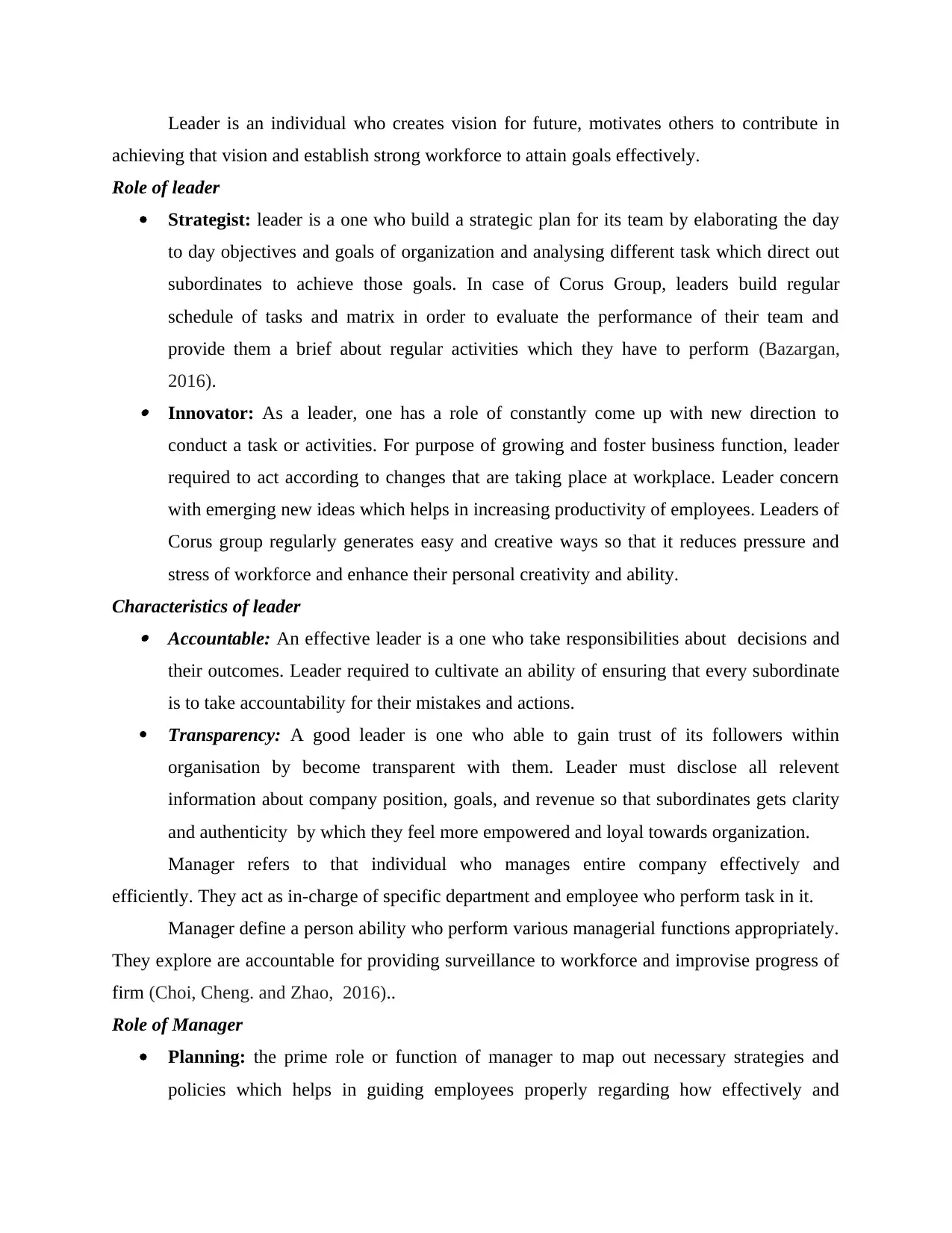
Leader is an individual who creates vision for future, motivates others to contribute in
achieving that vision and establish strong workforce to attain goals effectively.
Role of leader
Strategist: leader is a one who build a strategic plan for its team by elaborating the day
to day objectives and goals of organization and analysing different task which direct out
subordinates to achieve those goals. In case of Corus Group, leaders build regular
schedule of tasks and matrix in order to evaluate the performance of their team and
provide them a brief about regular activities which they have to perform (Bazargan,
2016). Innovator: As a leader, one has a role of constantly come up with new direction to
conduct a task or activities. For purpose of growing and foster business function, leader
required to act according to changes that are taking place at workplace. Leader concern
with emerging new ideas which helps in increasing productivity of employees. Leaders of
Corus group regularly generates easy and creative ways so that it reduces pressure and
stress of workforce and enhance their personal creativity and ability.
Characteristics of leader Accountable: An effective leader is a one who take responsibilities about decisions and
their outcomes. Leader required to cultivate an ability of ensuring that every subordinate
is to take accountability for their mistakes and actions.
Transparency: A good leader is one who able to gain trust of its followers within
organisation by become transparent with them. Leader must disclose all relevent
information about company position, goals, and revenue so that subordinates gets clarity
and authenticity by which they feel more empowered and loyal towards organization.
Manager refers to that individual who manages entire company effectively and
efficiently. They act as in-charge of specific department and employee who perform task in it.
Manager define a person ability who perform various managerial functions appropriately.
They explore are accountable for providing surveillance to workforce and improvise progress of
firm (Choi, Cheng. and Zhao, 2016)..
Role of Manager
Planning: the prime role or function of manager to map out necessary strategies and
policies which helps in guiding employees properly regarding how effectively and
achieving that vision and establish strong workforce to attain goals effectively.
Role of leader
Strategist: leader is a one who build a strategic plan for its team by elaborating the day
to day objectives and goals of organization and analysing different task which direct out
subordinates to achieve those goals. In case of Corus Group, leaders build regular
schedule of tasks and matrix in order to evaluate the performance of their team and
provide them a brief about regular activities which they have to perform (Bazargan,
2016). Innovator: As a leader, one has a role of constantly come up with new direction to
conduct a task or activities. For purpose of growing and foster business function, leader
required to act according to changes that are taking place at workplace. Leader concern
with emerging new ideas which helps in increasing productivity of employees. Leaders of
Corus group regularly generates easy and creative ways so that it reduces pressure and
stress of workforce and enhance their personal creativity and ability.
Characteristics of leader Accountable: An effective leader is a one who take responsibilities about decisions and
their outcomes. Leader required to cultivate an ability of ensuring that every subordinate
is to take accountability for their mistakes and actions.
Transparency: A good leader is one who able to gain trust of its followers within
organisation by become transparent with them. Leader must disclose all relevent
information about company position, goals, and revenue so that subordinates gets clarity
and authenticity by which they feel more empowered and loyal towards organization.
Manager refers to that individual who manages entire company effectively and
efficiently. They act as in-charge of specific department and employee who perform task in it.
Manager define a person ability who perform various managerial functions appropriately.
They explore are accountable for providing surveillance to workforce and improvise progress of
firm (Choi, Cheng. and Zhao, 2016)..
Role of Manager
Planning: the prime role or function of manager to map out necessary strategies and
policies which helps in guiding employees properly regarding how effectively and
Paraphrase This Document
Need a fresh take? Get an instant paraphrase of this document with our AI Paraphraser
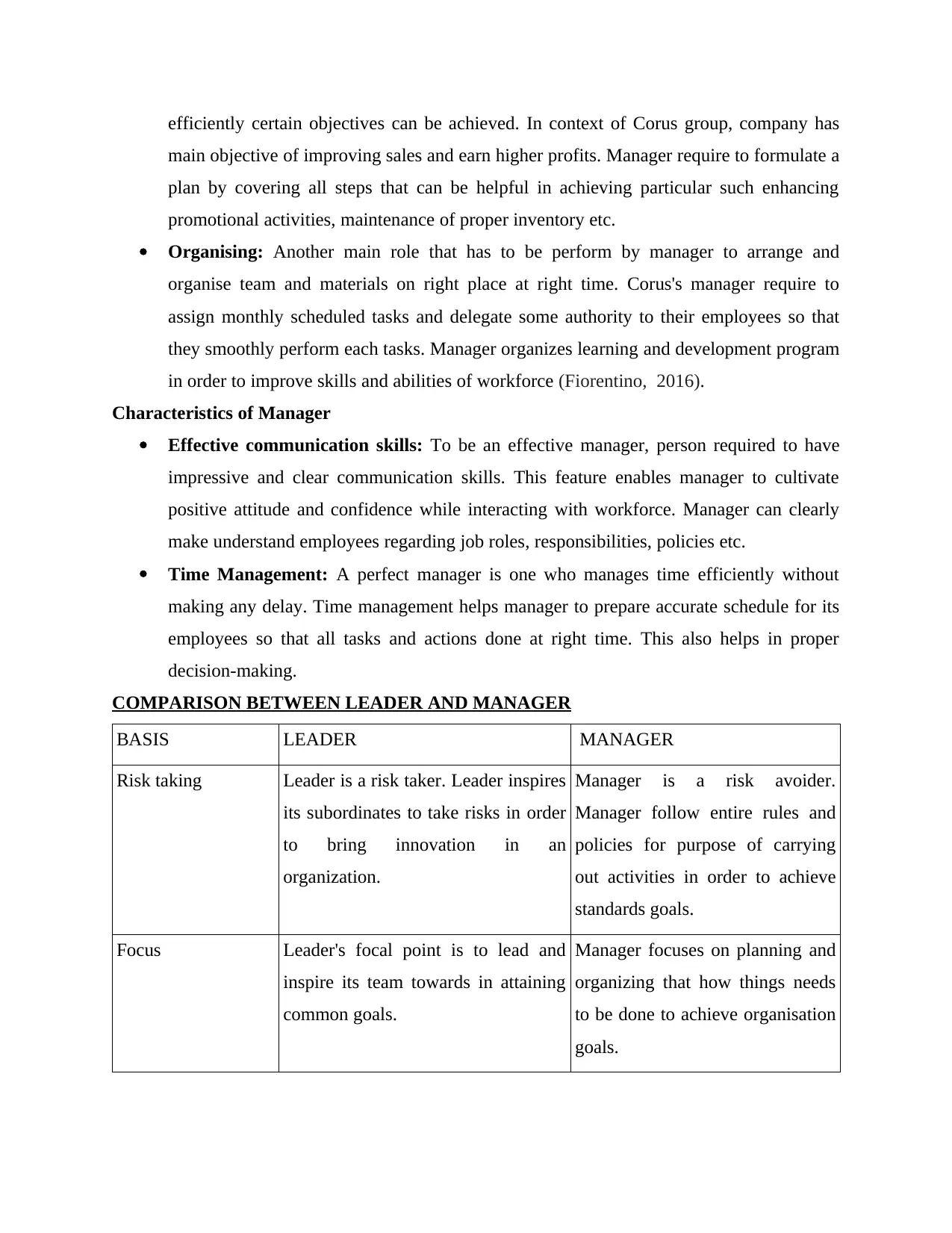
efficiently certain objectives can be achieved. In context of Corus group, company has
main objective of improving sales and earn higher profits. Manager require to formulate a
plan by covering all steps that can be helpful in achieving particular such enhancing
promotional activities, maintenance of proper inventory etc.
Organising: Another main role that has to be perform by manager to arrange and
organise team and materials on right place at right time. Corus's manager require to
assign monthly scheduled tasks and delegate some authority to their employees so that
they smoothly perform each tasks. Manager organizes learning and development program
in order to improve skills and abilities of workforce (Fiorentino, 2016).
Characteristics of Manager
Effective communication skills: To be an effective manager, person required to have
impressive and clear communication skills. This feature enables manager to cultivate
positive attitude and confidence while interacting with workforce. Manager can clearly
make understand employees regarding job roles, responsibilities, policies etc.
Time Management: A perfect manager is one who manages time efficiently without
making any delay. Time management helps manager to prepare accurate schedule for its
employees so that all tasks and actions done at right time. This also helps in proper
decision-making.
COMPARISON BETWEEN LEADER AND MANAGER
BASIS LEADER MANAGER
Risk taking Leader is a risk taker. Leader inspires
its subordinates to take risks in order
to bring innovation in an
organization.
Manager is a risk avoider.
Manager follow entire rules and
policies for purpose of carrying
out activities in order to achieve
standards goals.
Focus Leader's focal point is to lead and
inspire its team towards in attaining
common goals.
Manager focuses on planning and
organizing that how things needs
to be done to achieve organisation
goals.
main objective of improving sales and earn higher profits. Manager require to formulate a
plan by covering all steps that can be helpful in achieving particular such enhancing
promotional activities, maintenance of proper inventory etc.
Organising: Another main role that has to be perform by manager to arrange and
organise team and materials on right place at right time. Corus's manager require to
assign monthly scheduled tasks and delegate some authority to their employees so that
they smoothly perform each tasks. Manager organizes learning and development program
in order to improve skills and abilities of workforce (Fiorentino, 2016).
Characteristics of Manager
Effective communication skills: To be an effective manager, person required to have
impressive and clear communication skills. This feature enables manager to cultivate
positive attitude and confidence while interacting with workforce. Manager can clearly
make understand employees regarding job roles, responsibilities, policies etc.
Time Management: A perfect manager is one who manages time efficiently without
making any delay. Time management helps manager to prepare accurate schedule for its
employees so that all tasks and actions done at right time. This also helps in proper
decision-making.
COMPARISON BETWEEN LEADER AND MANAGER
BASIS LEADER MANAGER
Risk taking Leader is a risk taker. Leader inspires
its subordinates to take risks in order
to bring innovation in an
organization.
Manager is a risk avoider.
Manager follow entire rules and
policies for purpose of carrying
out activities in order to achieve
standards goals.
Focus Leader's focal point is to lead and
inspire its team towards in attaining
common goals.
Manager focuses on planning and
organizing that how things needs
to be done to achieve organisation
goals.
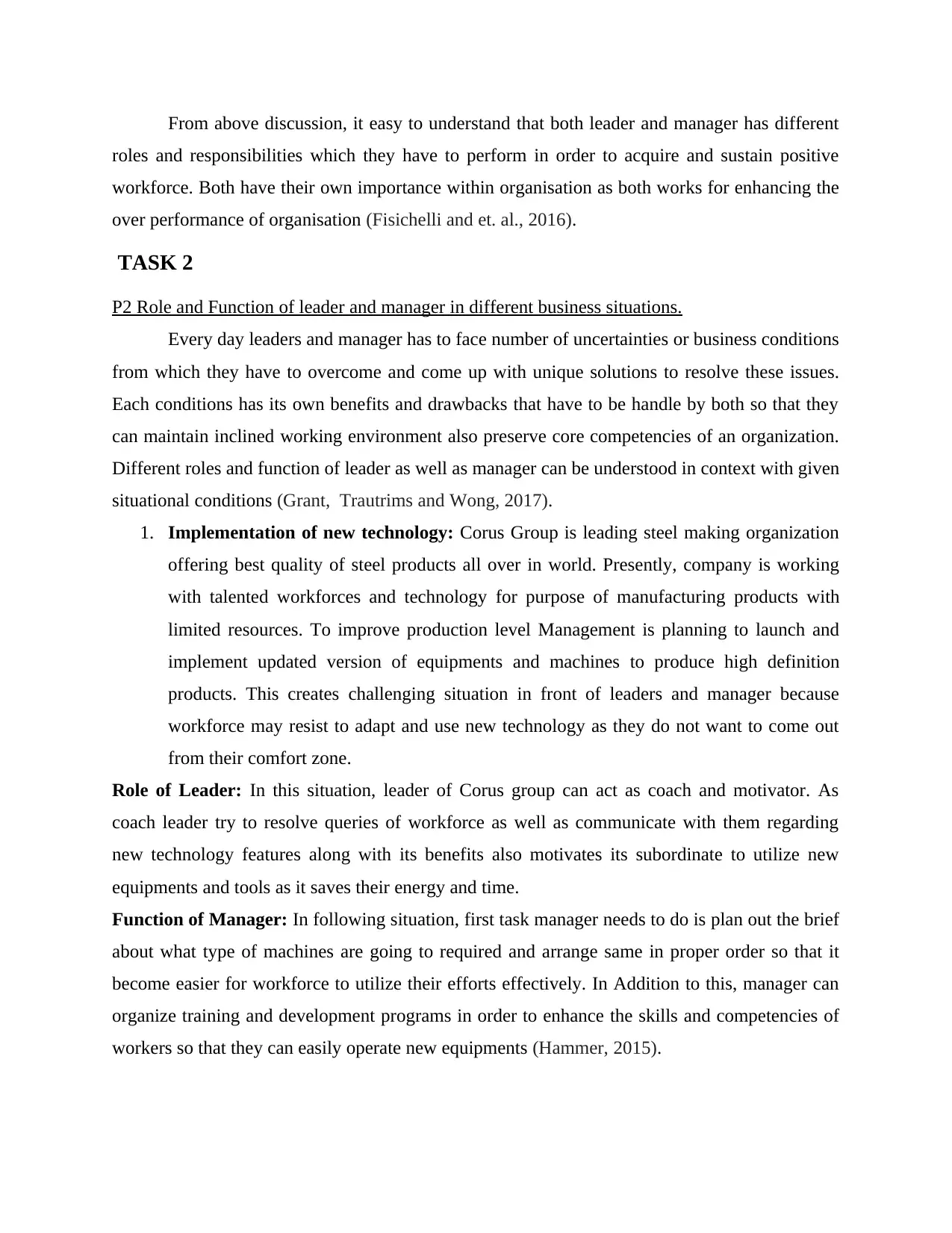
From above discussion, it easy to understand that both leader and manager has different
roles and responsibilities which they have to perform in order to acquire and sustain positive
workforce. Both have their own importance within organisation as both works for enhancing the
over performance of organisation (Fisichelli and et. al., 2016).
TASK 2
P2 Role and Function of leader and manager in different business situations.
Every day leaders and manager has to face number of uncertainties or business conditions
from which they have to overcome and come up with unique solutions to resolve these issues.
Each conditions has its own benefits and drawbacks that have to be handle by both so that they
can maintain inclined working environment also preserve core competencies of an organization.
Different roles and function of leader as well as manager can be understood in context with given
situational conditions (Grant, Trautrims and Wong, 2017).
1. Implementation of new technology: Corus Group is leading steel making organization
offering best quality of steel products all over in world. Presently, company is working
with talented workforces and technology for purpose of manufacturing products with
limited resources. To improve production level Management is planning to launch and
implement updated version of equipments and machines to produce high definition
products. This creates challenging situation in front of leaders and manager because
workforce may resist to adapt and use new technology as they do not want to come out
from their comfort zone.
Role of Leader: In this situation, leader of Corus group can act as coach and motivator. As
coach leader try to resolve queries of workforce as well as communicate with them regarding
new technology features along with its benefits also motivates its subordinate to utilize new
equipments and tools as it saves their energy and time.
Function of Manager: In following situation, first task manager needs to do is plan out the brief
about what type of machines are going to required and arrange same in proper order so that it
become easier for workforce to utilize their efforts effectively. In Addition to this, manager can
organize training and development programs in order to enhance the skills and competencies of
workers so that they can easily operate new equipments (Hammer, 2015).
roles and responsibilities which they have to perform in order to acquire and sustain positive
workforce. Both have their own importance within organisation as both works for enhancing the
over performance of organisation (Fisichelli and et. al., 2016).
TASK 2
P2 Role and Function of leader and manager in different business situations.
Every day leaders and manager has to face number of uncertainties or business conditions
from which they have to overcome and come up with unique solutions to resolve these issues.
Each conditions has its own benefits and drawbacks that have to be handle by both so that they
can maintain inclined working environment also preserve core competencies of an organization.
Different roles and function of leader as well as manager can be understood in context with given
situational conditions (Grant, Trautrims and Wong, 2017).
1. Implementation of new technology: Corus Group is leading steel making organization
offering best quality of steel products all over in world. Presently, company is working
with talented workforces and technology for purpose of manufacturing products with
limited resources. To improve production level Management is planning to launch and
implement updated version of equipments and machines to produce high definition
products. This creates challenging situation in front of leaders and manager because
workforce may resist to adapt and use new technology as they do not want to come out
from their comfort zone.
Role of Leader: In this situation, leader of Corus group can act as coach and motivator. As
coach leader try to resolve queries of workforce as well as communicate with them regarding
new technology features along with its benefits also motivates its subordinate to utilize new
equipments and tools as it saves their energy and time.
Function of Manager: In following situation, first task manager needs to do is plan out the brief
about what type of machines are going to required and arrange same in proper order so that it
become easier for workforce to utilize their efforts effectively. In Addition to this, manager can
organize training and development programs in order to enhance the skills and competencies of
workers so that they can easily operate new equipments (Hammer, 2015).
⊘ This is a preview!⊘
Do you want full access?
Subscribe today to unlock all pages.

Trusted by 1+ million students worldwide

2. Acquisition of new company: Course group enjoys competitive position in steel
industry. Company always try to expand its business growth time to time. In order to
expand its empire, management of firm are planning for acquiring functions and stakes of
other organization. This creates a complicated circumstances in front of Corus leaders
and manager because if company obtain operations of other firm then it will bring new
employees, culture, objectives and goals and other different things due to which it creates
lack of communication and unclear environment between existing employees and
management.
Role of Leader: In this particular situation, leader required to bring transparency and disclose all
relevant details about new firm also explains reasons behind takeover to workforce. Here, leader
needs to show their interpersonal skills in order to avoid conditions of conflicts between existing
and new employees by using different conflicts resolving approach (Hoyos, Morales and
Akhavan-Tabatabaei, 2015).
Function of Manager: In this particular conditions, managers required to generate new policies
and strategies in attainment of new goals and objectives. These policies and methods act as
guidance to employees regarding where they have to put their efforts and how. Manager needs to
cultivate cordial environment within an organisation where everyone can openly express
themselves.
P3 Leadership Models and Theories.
Leadership models and theories refers as key guidelines that recommend certain
leadership styles or behaviours that are used by leader in specific condition or environment.
Leadership defines as act of getting things done by other people in effective and efficient
manner. There number of leadership theories that can be consider by leaders in order to supervise
and guide the efforts of workforce towards common goal and keep enhancing their skills.
Different models of leadership has their own strengths and weaknesses that are explained below.
1. Situational leadership: this particular model explains that leaders make use of separate
leadership styles on basis of different situational requirements. This is an effective way to
understand and support needs of team and establish proper balance within entire
organization. This model contains various style such as supportive, coaching, delegating
and directing (Kato and et. al., 2015). This model is based on assumption that leader can
modifies its style in order to fit according to situation and it motivates leader to adopt
industry. Company always try to expand its business growth time to time. In order to
expand its empire, management of firm are planning for acquiring functions and stakes of
other organization. This creates a complicated circumstances in front of Corus leaders
and manager because if company obtain operations of other firm then it will bring new
employees, culture, objectives and goals and other different things due to which it creates
lack of communication and unclear environment between existing employees and
management.
Role of Leader: In this particular situation, leader required to bring transparency and disclose all
relevant details about new firm also explains reasons behind takeover to workforce. Here, leader
needs to show their interpersonal skills in order to avoid conditions of conflicts between existing
and new employees by using different conflicts resolving approach (Hoyos, Morales and
Akhavan-Tabatabaei, 2015).
Function of Manager: In this particular conditions, managers required to generate new policies
and strategies in attainment of new goals and objectives. These policies and methods act as
guidance to employees regarding where they have to put their efforts and how. Manager needs to
cultivate cordial environment within an organisation where everyone can openly express
themselves.
P3 Leadership Models and Theories.
Leadership models and theories refers as key guidelines that recommend certain
leadership styles or behaviours that are used by leader in specific condition or environment.
Leadership defines as act of getting things done by other people in effective and efficient
manner. There number of leadership theories that can be consider by leaders in order to supervise
and guide the efforts of workforce towards common goal and keep enhancing their skills.
Different models of leadership has their own strengths and weaknesses that are explained below.
1. Situational leadership: this particular model explains that leaders make use of separate
leadership styles on basis of different situational requirements. This is an effective way to
understand and support needs of team and establish proper balance within entire
organization. This model contains various style such as supportive, coaching, delegating
and directing (Kato and et. al., 2015). This model is based on assumption that leader can
modifies its style in order to fit according to situation and it motivates leader to adopt
Paraphrase This Document
Need a fresh take? Get an instant paraphrase of this document with our AI Paraphraser
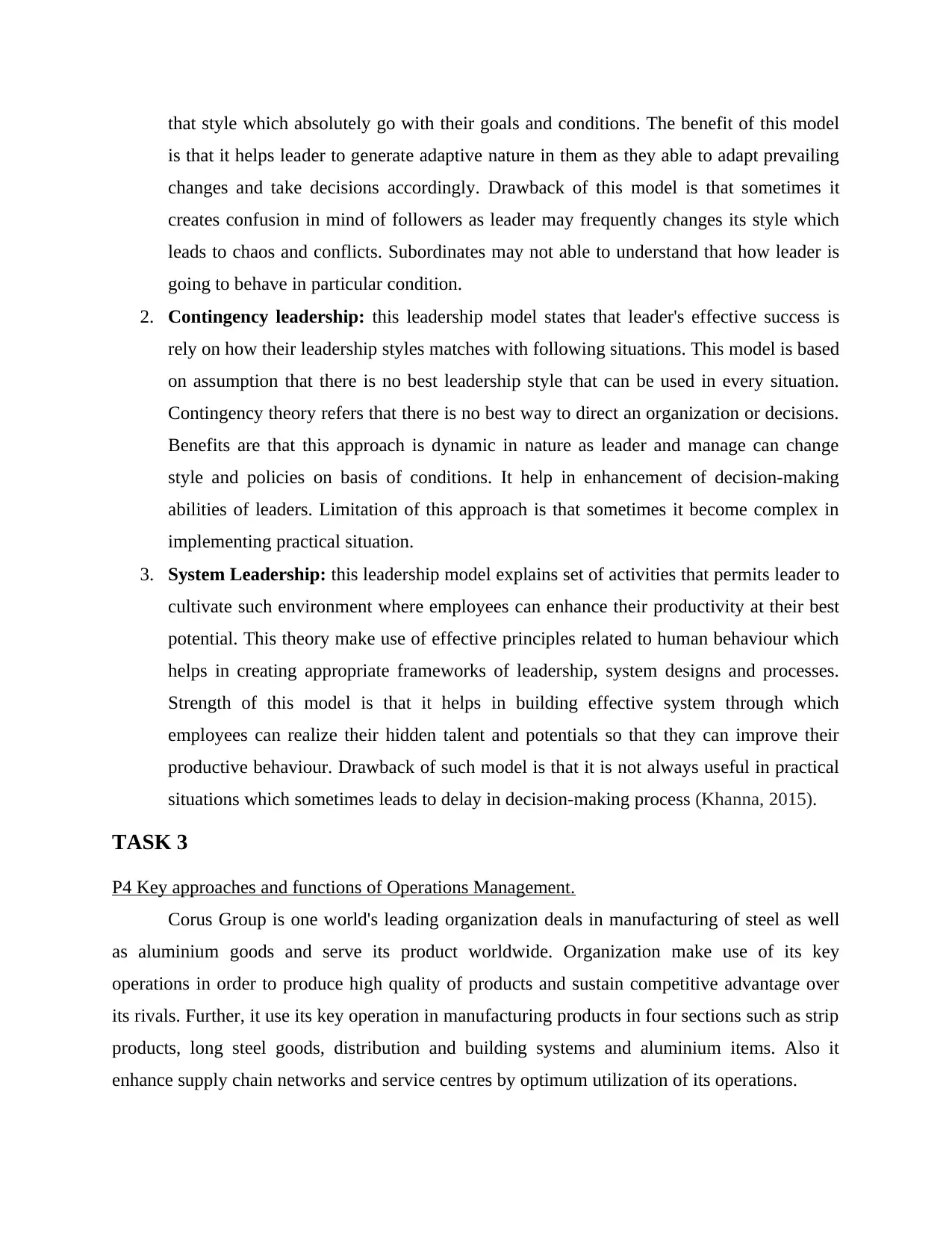
that style which absolutely go with their goals and conditions. The benefit of this model
is that it helps leader to generate adaptive nature in them as they able to adapt prevailing
changes and take decisions accordingly. Drawback of this model is that sometimes it
creates confusion in mind of followers as leader may frequently changes its style which
leads to chaos and conflicts. Subordinates may not able to understand that how leader is
going to behave in particular condition.
2. Contingency leadership: this leadership model states that leader's effective success is
rely on how their leadership styles matches with following situations. This model is based
on assumption that there is no best leadership style that can be used in every situation.
Contingency theory refers that there is no best way to direct an organization or decisions.
Benefits are that this approach is dynamic in nature as leader and manage can change
style and policies on basis of conditions. It help in enhancement of decision-making
abilities of leaders. Limitation of this approach is that sometimes it become complex in
implementing practical situation.
3. System Leadership: this leadership model explains set of activities that permits leader to
cultivate such environment where employees can enhance their productivity at their best
potential. This theory make use of effective principles related to human behaviour which
helps in creating appropriate frameworks of leadership, system designs and processes.
Strength of this model is that it helps in building effective system through which
employees can realize their hidden talent and potentials so that they can improve their
productive behaviour. Drawback of such model is that it is not always useful in practical
situations which sometimes leads to delay in decision-making process (Khanna, 2015).
TASK 3
P4 Key approaches and functions of Operations Management.
Corus Group is one world's leading organization deals in manufacturing of steel as well
as aluminium goods and serve its product worldwide. Organization make use of its key
operations in order to produce high quality of products and sustain competitive advantage over
its rivals. Further, it use its key operation in manufacturing products in four sections such as strip
products, long steel goods, distribution and building systems and aluminium items. Also it
enhance supply chain networks and service centres by optimum utilization of its operations.
is that it helps leader to generate adaptive nature in them as they able to adapt prevailing
changes and take decisions accordingly. Drawback of this model is that sometimes it
creates confusion in mind of followers as leader may frequently changes its style which
leads to chaos and conflicts. Subordinates may not able to understand that how leader is
going to behave in particular condition.
2. Contingency leadership: this leadership model states that leader's effective success is
rely on how their leadership styles matches with following situations. This model is based
on assumption that there is no best leadership style that can be used in every situation.
Contingency theory refers that there is no best way to direct an organization or decisions.
Benefits are that this approach is dynamic in nature as leader and manage can change
style and policies on basis of conditions. It help in enhancement of decision-making
abilities of leaders. Limitation of this approach is that sometimes it become complex in
implementing practical situation.
3. System Leadership: this leadership model explains set of activities that permits leader to
cultivate such environment where employees can enhance their productivity at their best
potential. This theory make use of effective principles related to human behaviour which
helps in creating appropriate frameworks of leadership, system designs and processes.
Strength of this model is that it helps in building effective system through which
employees can realize their hidden talent and potentials so that they can improve their
productive behaviour. Drawback of such model is that it is not always useful in practical
situations which sometimes leads to delay in decision-making process (Khanna, 2015).
TASK 3
P4 Key approaches and functions of Operations Management.
Corus Group is one world's leading organization deals in manufacturing of steel as well
as aluminium goods and serve its product worldwide. Organization make use of its key
operations in order to produce high quality of products and sustain competitive advantage over
its rivals. Further, it use its key operation in manufacturing products in four sections such as strip
products, long steel goods, distribution and building systems and aluminium items. Also it
enhance supply chain networks and service centres by optimum utilization of its operations.
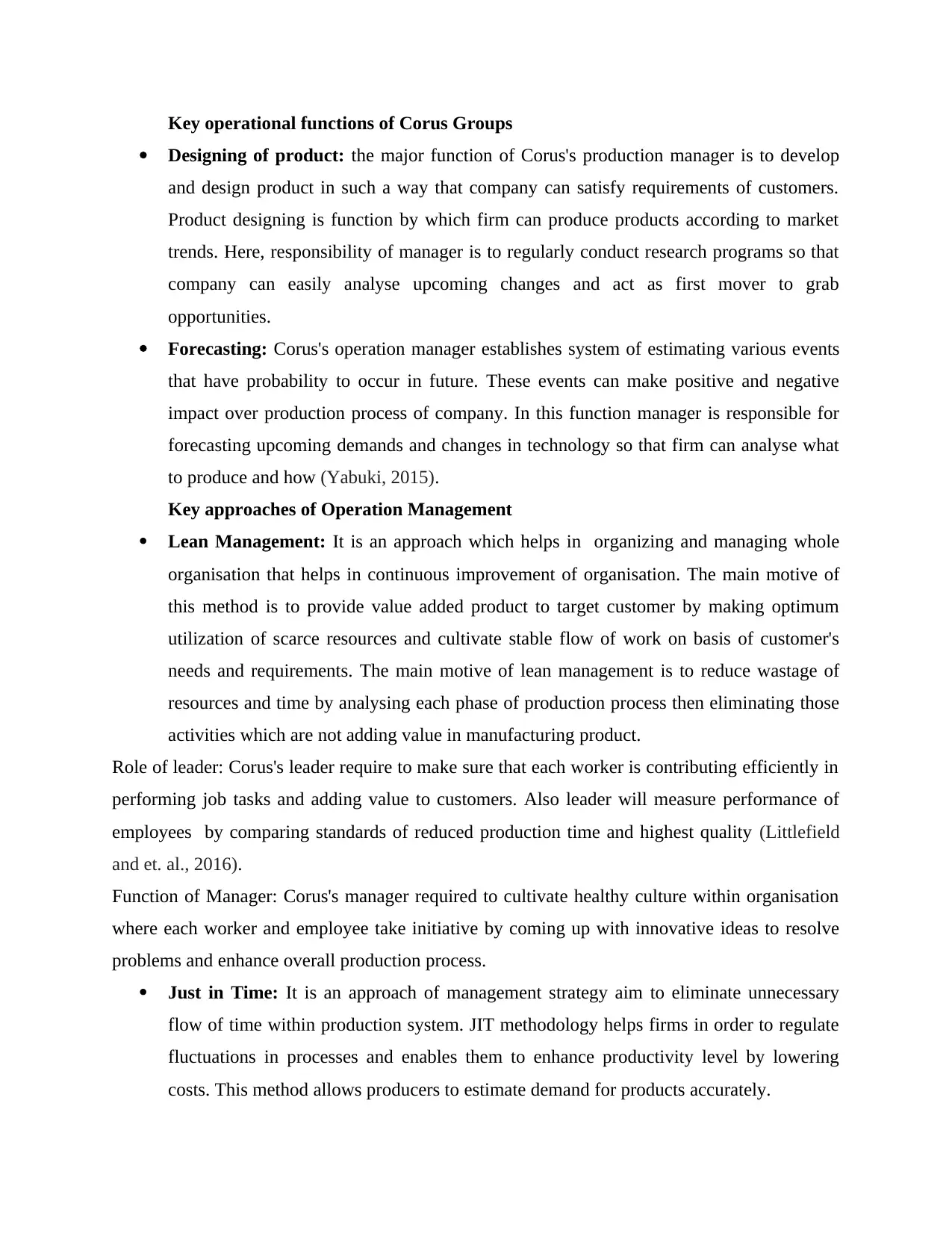
Key operational functions of Corus Groups
Designing of product: the major function of Corus's production manager is to develop
and design product in such a way that company can satisfy requirements of customers.
Product designing is function by which firm can produce products according to market
trends. Here, responsibility of manager is to regularly conduct research programs so that
company can easily analyse upcoming changes and act as first mover to grab
opportunities.
Forecasting: Corus's operation manager establishes system of estimating various events
that have probability to occur in future. These events can make positive and negative
impact over production process of company. In this function manager is responsible for
forecasting upcoming demands and changes in technology so that firm can analyse what
to produce and how (Yabuki, 2015).
Key approaches of Operation Management
Lean Management: It is an approach which helps in organizing and managing whole
organisation that helps in continuous improvement of organisation. The main motive of
this method is to provide value added product to target customer by making optimum
utilization of scarce resources and cultivate stable flow of work on basis of customer's
needs and requirements. The main motive of lean management is to reduce wastage of
resources and time by analysing each phase of production process then eliminating those
activities which are not adding value in manufacturing product.
Role of leader: Corus's leader require to make sure that each worker is contributing efficiently in
performing job tasks and adding value to customers. Also leader will measure performance of
employees by comparing standards of reduced production time and highest quality (Littlefield
and et. al., 2016).
Function of Manager: Corus's manager required to cultivate healthy culture within organisation
where each worker and employee take initiative by coming up with innovative ideas to resolve
problems and enhance overall production process.
Just in Time: It is an approach of management strategy aim to eliminate unnecessary
flow of time within production system. JIT methodology helps firms in order to regulate
fluctuations in processes and enables them to enhance productivity level by lowering
costs. This method allows producers to estimate demand for products accurately.
Designing of product: the major function of Corus's production manager is to develop
and design product in such a way that company can satisfy requirements of customers.
Product designing is function by which firm can produce products according to market
trends. Here, responsibility of manager is to regularly conduct research programs so that
company can easily analyse upcoming changes and act as first mover to grab
opportunities.
Forecasting: Corus's operation manager establishes system of estimating various events
that have probability to occur in future. These events can make positive and negative
impact over production process of company. In this function manager is responsible for
forecasting upcoming demands and changes in technology so that firm can analyse what
to produce and how (Yabuki, 2015).
Key approaches of Operation Management
Lean Management: It is an approach which helps in organizing and managing whole
organisation that helps in continuous improvement of organisation. The main motive of
this method is to provide value added product to target customer by making optimum
utilization of scarce resources and cultivate stable flow of work on basis of customer's
needs and requirements. The main motive of lean management is to reduce wastage of
resources and time by analysing each phase of production process then eliminating those
activities which are not adding value in manufacturing product.
Role of leader: Corus's leader require to make sure that each worker is contributing efficiently in
performing job tasks and adding value to customers. Also leader will measure performance of
employees by comparing standards of reduced production time and highest quality (Littlefield
and et. al., 2016).
Function of Manager: Corus's manager required to cultivate healthy culture within organisation
where each worker and employee take initiative by coming up with innovative ideas to resolve
problems and enhance overall production process.
Just in Time: It is an approach of management strategy aim to eliminate unnecessary
flow of time within production system. JIT methodology helps firms in order to regulate
fluctuations in processes and enables them to enhance productivity level by lowering
costs. This method allows producers to estimate demand for products accurately.
⊘ This is a preview!⊘
Do you want full access?
Subscribe today to unlock all pages.

Trusted by 1+ million students worldwide
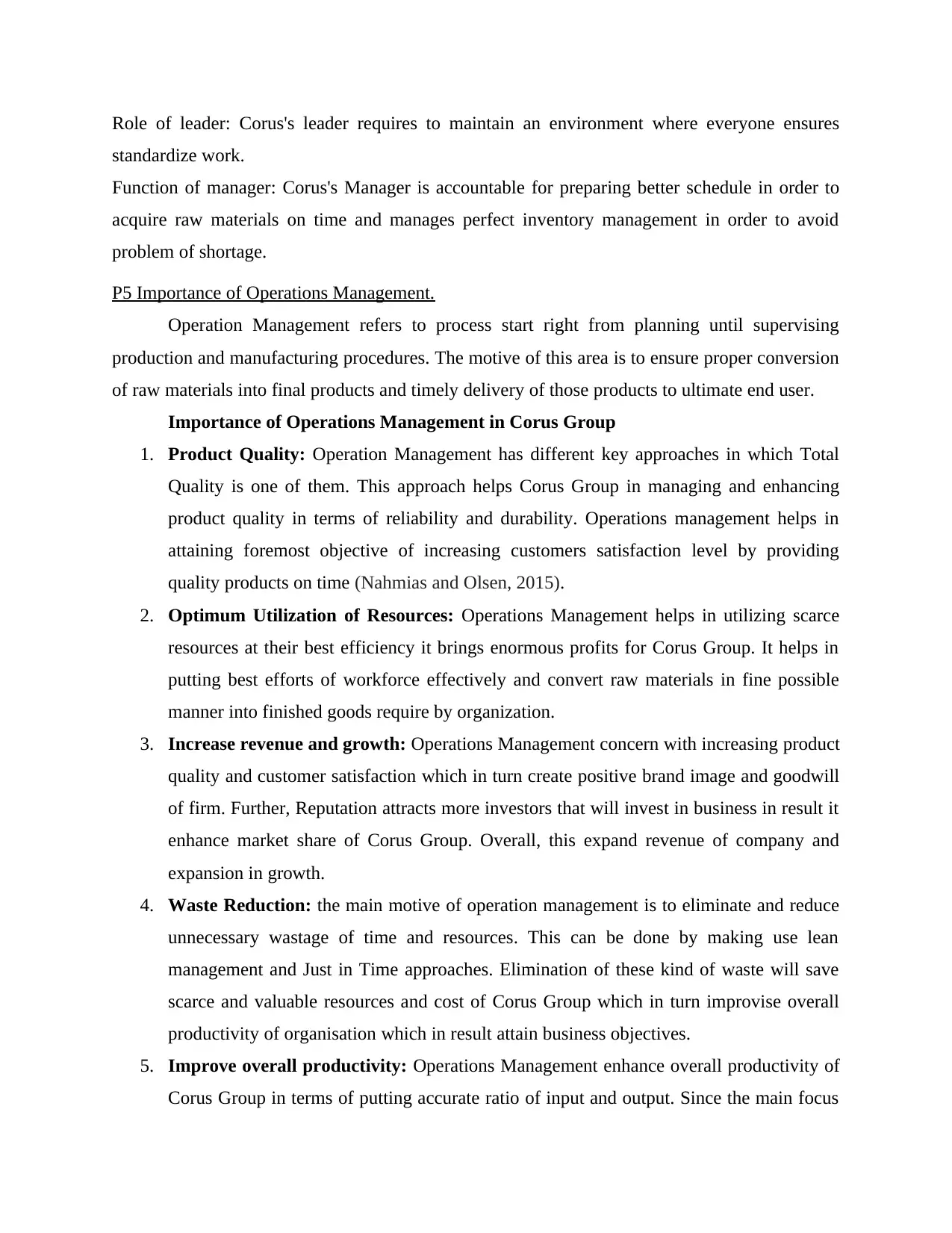
Role of leader: Corus's leader requires to maintain an environment where everyone ensures
standardize work.
Function of manager: Corus's Manager is accountable for preparing better schedule in order to
acquire raw materials on time and manages perfect inventory management in order to avoid
problem of shortage.
P5 Importance of Operations Management.
Operation Management refers to process start right from planning until supervising
production and manufacturing procedures. The motive of this area is to ensure proper conversion
of raw materials into final products and timely delivery of those products to ultimate end user.
Importance of Operations Management in Corus Group
1. Product Quality: Operation Management has different key approaches in which Total
Quality is one of them. This approach helps Corus Group in managing and enhancing
product quality in terms of reliability and durability. Operations management helps in
attaining foremost objective of increasing customers satisfaction level by providing
quality products on time (Nahmias and Olsen, 2015).
2. Optimum Utilization of Resources: Operations Management helps in utilizing scarce
resources at their best efficiency it brings enormous profits for Corus Group. It helps in
putting best efforts of workforce effectively and convert raw materials in fine possible
manner into finished goods require by organization.
3. Increase revenue and growth: Operations Management concern with increasing product
quality and customer satisfaction which in turn create positive brand image and goodwill
of firm. Further, Reputation attracts more investors that will invest in business in result it
enhance market share of Corus Group. Overall, this expand revenue of company and
expansion in growth.
4. Waste Reduction: the main motive of operation management is to eliminate and reduce
unnecessary wastage of time and resources. This can be done by making use lean
management and Just in Time approaches. Elimination of these kind of waste will save
scarce and valuable resources and cost of Corus Group which in turn improvise overall
productivity of organisation which in result attain business objectives.
5. Improve overall productivity: Operations Management enhance overall productivity of
Corus Group in terms of putting accurate ratio of input and output. Since the main focus
standardize work.
Function of manager: Corus's Manager is accountable for preparing better schedule in order to
acquire raw materials on time and manages perfect inventory management in order to avoid
problem of shortage.
P5 Importance of Operations Management.
Operation Management refers to process start right from planning until supervising
production and manufacturing procedures. The motive of this area is to ensure proper conversion
of raw materials into final products and timely delivery of those products to ultimate end user.
Importance of Operations Management in Corus Group
1. Product Quality: Operation Management has different key approaches in which Total
Quality is one of them. This approach helps Corus Group in managing and enhancing
product quality in terms of reliability and durability. Operations management helps in
attaining foremost objective of increasing customers satisfaction level by providing
quality products on time (Nahmias and Olsen, 2015).
2. Optimum Utilization of Resources: Operations Management helps in utilizing scarce
resources at their best efficiency it brings enormous profits for Corus Group. It helps in
putting best efforts of workforce effectively and convert raw materials in fine possible
manner into finished goods require by organization.
3. Increase revenue and growth: Operations Management concern with increasing product
quality and customer satisfaction which in turn create positive brand image and goodwill
of firm. Further, Reputation attracts more investors that will invest in business in result it
enhance market share of Corus Group. Overall, this expand revenue of company and
expansion in growth.
4. Waste Reduction: the main motive of operation management is to eliminate and reduce
unnecessary wastage of time and resources. This can be done by making use lean
management and Just in Time approaches. Elimination of these kind of waste will save
scarce and valuable resources and cost of Corus Group which in turn improvise overall
productivity of organisation which in result attain business objectives.
5. Improve overall productivity: Operations Management enhance overall productivity of
Corus Group in terms of putting accurate ratio of input and output. Since the main focus
Paraphrase This Document
Need a fresh take? Get an instant paraphrase of this document with our AI Paraphraser

of this department is to utilize resources in best possible manner in order to achieve
mission goals and objectives (Ravinder and Kollikkathara, 2017).
TASK 4
P6 Factors affecting operational decisions.
There various external factors which affects operations and functions of organisation as
well as decisions of leaders and managers. It is important for management to assess and examine
these forces thoroughly so that they can able to formulate and implement polices and strategies
in order to integrate workforce efforts with organisation objectives. These factors can be analyse
through PEST model for purpose of examine their effects over Corus Group activities.
Political Factors: Currently, UK has stable political environment influence operations of
Corus group. Stable environment provides stability in laws and regulations due to which
organisation can make long term policies and objectives. Due to Brexit revolution
functions of company are get influenced.
Economic Factors: these factors related to economy of country such as GDP, income of
consumers and monetary policies. UK has effective economical policies these impact
positively over the functions of organisation. This reduces the cost of production and
increases the revenue for company.
Social Factors: these factors refers to taste and preferences of customers as well as
changes in trends. This affects operation of company cause buyers taste and preferences
are dynamic in nature and changes frequently this impact over designing and
development of products. Company required to consistently examine the needs and
requirements of customers so that firm can produce accordingly.
Technological Factors: these factors are related to technology. UK known for its
advanced technological hub which affects working of organisation. As new technology
emerge company required to channelise its efforts according to latest version of
techniques. Organisation needs to develop new methods and strategies in order to cope up
with updated version of technology (Schwarz, Hall and Shibli, 2015).
mission goals and objectives (Ravinder and Kollikkathara, 2017).
TASK 4
P6 Factors affecting operational decisions.
There various external factors which affects operations and functions of organisation as
well as decisions of leaders and managers. It is important for management to assess and examine
these forces thoroughly so that they can able to formulate and implement polices and strategies
in order to integrate workforce efforts with organisation objectives. These factors can be analyse
through PEST model for purpose of examine their effects over Corus Group activities.
Political Factors: Currently, UK has stable political environment influence operations of
Corus group. Stable environment provides stability in laws and regulations due to which
organisation can make long term policies and objectives. Due to Brexit revolution
functions of company are get influenced.
Economic Factors: these factors related to economy of country such as GDP, income of
consumers and monetary policies. UK has effective economical policies these impact
positively over the functions of organisation. This reduces the cost of production and
increases the revenue for company.
Social Factors: these factors refers to taste and preferences of customers as well as
changes in trends. This affects operation of company cause buyers taste and preferences
are dynamic in nature and changes frequently this impact over designing and
development of products. Company required to consistently examine the needs and
requirements of customers so that firm can produce accordingly.
Technological Factors: these factors are related to technology. UK known for its
advanced technological hub which affects working of organisation. As new technology
emerge company required to channelise its efforts according to latest version of
techniques. Organisation needs to develop new methods and strategies in order to cope up
with updated version of technology (Schwarz, Hall and Shibli, 2015).
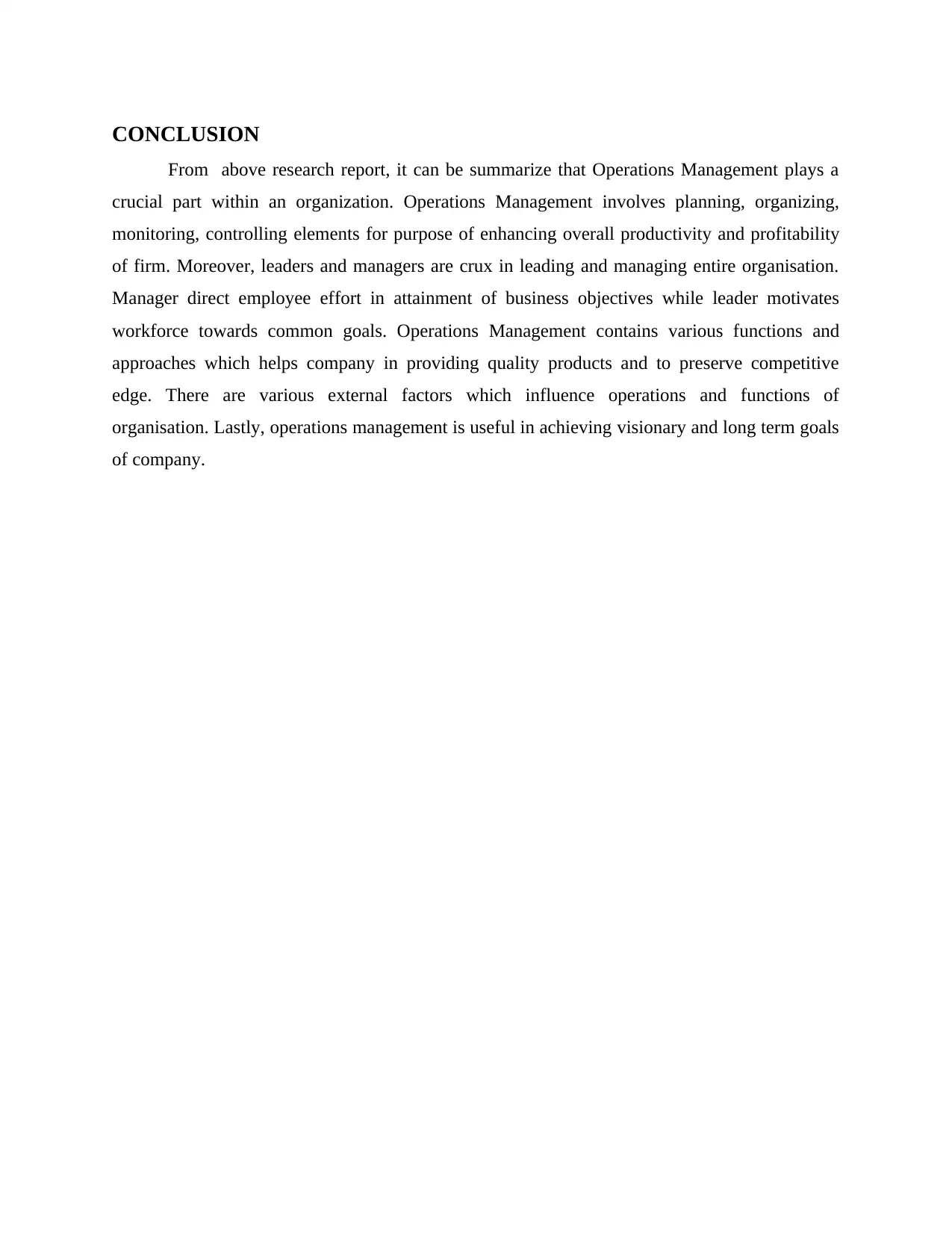
CONCLUSION
From above research report, it can be summarize that Operations Management plays a
crucial part within an organization. Operations Management involves planning, organizing,
monitoring, controlling elements for purpose of enhancing overall productivity and profitability
of firm. Moreover, leaders and managers are crux in leading and managing entire organisation.
Manager direct employee effort in attainment of business objectives while leader motivates
workforce towards common goals. Operations Management contains various functions and
approaches which helps company in providing quality products and to preserve competitive
edge. There are various external factors which influence operations and functions of
organisation. Lastly, operations management is useful in achieving visionary and long term goals
of company.
From above research report, it can be summarize that Operations Management plays a
crucial part within an organization. Operations Management involves planning, organizing,
monitoring, controlling elements for purpose of enhancing overall productivity and profitability
of firm. Moreover, leaders and managers are crux in leading and managing entire organisation.
Manager direct employee effort in attainment of business objectives while leader motivates
workforce towards common goals. Operations Management contains various functions and
approaches which helps company in providing quality products and to preserve competitive
edge. There are various external factors which influence operations and functions of
organisation. Lastly, operations management is useful in achieving visionary and long term goals
of company.
⊘ This is a preview!⊘
Do you want full access?
Subscribe today to unlock all pages.

Trusted by 1+ million students worldwide
1 out of 14
Related Documents
Your All-in-One AI-Powered Toolkit for Academic Success.
+13062052269
info@desklib.com
Available 24*7 on WhatsApp / Email
![[object Object]](/_next/static/media/star-bottom.7253800d.svg)
Unlock your academic potential
Copyright © 2020–2026 A2Z Services. All Rights Reserved. Developed and managed by ZUCOL.





